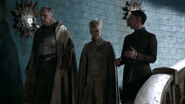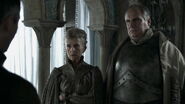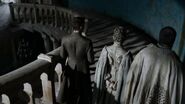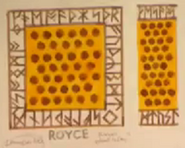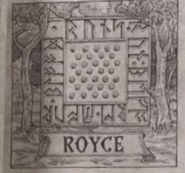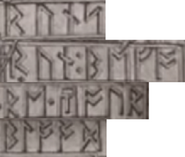The Old Tongue is the ancient, rune-based language spoken in Westeros by the First Men. The Old Tongue was gradually supplanted by the language and alphabet of the Andals, now known as the "Common Tongue" of Westeros.
In the present day, however, the Old Tongue is still used by some of the wildlings in the far reaches of the lands beyond the Wall.[1] The Thenn people, for example, still speak the Old Tongue.[2] The non-human race of Giants live in the farthest northern reaches of the lands beyond the Wall and therefore had no contact with Andal peoples to the south, thus the giants speak only a rudimentary version of the Old Tongue known as "Mag Nuk", the Great Tongue. However, Tormund thinks that they've picked up a better understanding of words and phrases from the Common Tongue than they let on.[3]
Dialects
The lands beyond the Wall are quite rugged, with little in terms of long-distance trade or travel, and this geographic isolation resulted in the wildlings diverging into about six major subgroups, each of which speaks its own sub-dialect of the Old Tongue. Mance Rayder remarked to Jon Snow that the wildlings in his army spoke seven "languages" (apparently six dialects of Old Tongue, plus those who can speak the Common Tongue of the Andals).[4]
- Of these six dialects, only the dialect spoken by the giants has appeared in the TV series, a very brief sample in Season 5.
Mag Nuk
Mag Nuk (meaning "The Great Tongue") is the dialect of the Old Tongue used by the non-human race of giants. Because giants simply do not have the mental capacity of an ordinary human being, they actually speak an extremely simplified pidgin of Old Tongue. Essentially all linguistic rules of syntax and morphology have been dropped. Apparently in ancient times the giants learned what they could of the Old Tongue spoken by the First Men and eventually abandoned whatever previous language they used. Most linguistic features or rules that the original Old Tongue had - noun declension, pluralization, verb tense, etc. - were dropped entirely (and it isn't even clear if the original Old Tongue had these features to begin with).[5]
Another drastic simplification is that all polysyllable words from the original Old Tongue were shortened to a single syllable. For example, while "skagos" means "rock" in regular Old Tongue, the word for "rock" in Mag Nuk was shortened to simply "skag". This seems to match giant naming conventions, also limited to monosyllable words: the giant leader nicknamed "Mag the Mighty" is properly named "Mag Mar Tun Doh Weg".
Even the phonology of the original Old Tongue was simplified in Mag Nuk. Vowels are o [ɔ]; a [æ], unless it’s before r, in which case it’s [ɑ]; i [ɪ]; u [ǝ]. Then for the few consonants that might be confused, kh [x]; r [ɹ]; th [θ].[6]
Even Mag Nuk itself is not used very consistently by the giants, and use can be quite sloppy from one individual to the next.
The only extant example, spoken by Wun Weg Wun Dar Wun in Season 5's "Hardhome", is:
- Lokh doys bar thol kif rukh?
- Who/what fuck/shit you sit look it/him? = "What the fuck you looking at?"
This was also shortened down to:
- Lokh kif rukh?[7]
- Literally, "What look it/him?"
The corresponding regular Old Tongue phrase would be something loosely along the lines of:
- Lokh doysen bar thol kifos rukh?[8]
Mag Nuk Lexicon:
- bar - you
- doys - fuck!/shit! (general curse word, meaning is variable)
- kif - look
- lokh - Who/What? (general question word)
- mag - great
- nuk - tongue/language
- rukh - it/him
- skag - rock
- thol - sit
- In the novels, it is said the giants call the Children of the Forest "woh dak nag gram", which means "little squirrel people".
Behind the scenes
The Old Tongue of the First Men is the only language said to exist beyond the Wall in the books. In the TV series, Mance Rayder states that the diverse wildling clans in his army speak seven different languages. One of these would be the Common Tongue, but this still multiplies the number of other languages from one to six. David J. Peterson, the language consultant on the TV series, explained that it was felt to strain linguistic credibility for all of the diverse, politically disunited, and in some cases extremely isolated wildlings to speak one uniform version of the Old Tongue. I.e. the isolated and cannibalistic Ice-river clans to the northwest of the Frostfang Mountains are extremely isolated, as are the insular Thenn who live in a fertile valley heated by volcanic activity in the far north of the Frostfangs. Peterson's explanation for the TV series is that what is called "the Old Tongue" is a family of dialects which have diverged so much that they are not mutually intelligible anymore and may more properly be termed "languages": comparable to saying that people in medieval Spain spoke "Spanish", when in fact this refers to a family of dialects such as Castillian and Catalan. Peterson pointed out that the book chapters which say the wildlings speak "the Old Tongue" are told from Jon Snow's POV, a character who does not speak the Old Tongue at all, and thus might not be an objectively accurate source:
- "Recall that GRRM’s narration is third person limited, and that the narrator is frequently wrong (e.g. when it's with a character who believes that another character is dead when in fact they’re alive, the narrator will say things like, "With x dead, y now didn’t know what to do", or the like, and it's up to the reader to remember that x is not dead). I never have a hard time believing that there's more linguistic diversity where there’s said to be less. For example, in Spain, it's often said (by Castillian speakers) that everyone speaks Spanish, but that there are different "dialects": Catalán, Galiciano, Basque (yes: there are some that will claim that Basque is nothing more than a dialect of Spanish). Given a name as fanciful as "the Old Tongue", I’d have no trouble believing that "the Old Tongue" actually stood for four, five, six, ten, twelve languages.[9]
By Season 4, costume designer Michele Clapton actually said that she had developed six major subdivisions for the wildlings, six different categories of costumes based on geographic origin. While he did not list then clearly, they are apparently:
- 1 - Wildlings from the Haunted Forest, by far the majority of wildlings, who wear heavy furs.
- 2 - Wildlings from the coasts, who decorate their clothing with seashells, such as Karsi.
- 3 - Wildlings from up in the mountains, who decorate their clothing with bones, such as the Lord of Bones.
- 4 - The Cave people, who live inside the cave systems of the Frostfang Mountains, notable for wearing facepaint.
- 5 - The Thenns, who practice scarification and can forge their own bronze, so they have their own metal armor, made of simple bronze disks strung together.
- 6 - The non-human Giants, who just haphazardly wrap themselves in whatever bits of cloth, fur, or bone they can find.
By chance or design, these numbers actually match up: if the wildlings speak "seven languages", one of which is the Common Tongue of the Andals from the south, there would logically need to be about six major groupings of wildlings, each speaking one of six major dialects of "Old Tongue".
Of these apparently six major sub-dialects of the Old Tongue, only the "Mag Nuk" dialect of the giants has been even briefly described by Peterson. Only a single phrase from Mag Nuk was developed - but Peterson also provided a sample of what this phrase would look like in normal, unsimplified Old Tongue (probably from the "main" dialect spoken by the vast majority of wildlings, from the Haunted Forest).
By Season 5, Peterson expressed his doubt that the Old Tongue would ever be fully developed for the TV series. However, he focused on a statement by George R.R. Martin pointing out that due to their low intellectual capacity, the giants can only speak a crude and simplified sub-dialect of Old Tongue (on the "you no take candle" level). Martin's exact words were: "The giants are not literate, and, truth be told, are not all that bright either. They do speak the Old Tongue, after a fashion, but not well."
Peterson therefore saw this as an opportunity to make a short phrase in a very simplified version of the Old Tongue, without actually having to be beholden to fully working out what real Old Tongue is like. That way if a future TV season or project years in the future ever actually does require real Old Tongue dialogue spoken by human wildlings, Peterson can have a free hand to develop it fully at that time. Officially, whatever linguistic rules the real Old Tongue may have - such as noun declension, pluralization, or verb tenses - are simply absent from "Mag Nuk" dialect spoken by the giants, so they didn't need to be developed yet.
Martin did say that the giants speak a simplified pidgin of the Old Tongue, but it was Peterson who developed it and officially named this sub-dialect "Mag Nuk". Peterson stressed that the brief example he outlined for Season 5's "Hardhome" is very provisional.[10]
Writing system
The Old Tongue has a simple, rune-based writing system, but it was never used for anything more advanced than marking graves. Thus the earliest written histories in Westeros only date back to six thousand years ago when the Andal Invasion introduced the full alphabet writing system of the Andal language (the Common Tongue). The First Men didn't use their rune system to write historical narratives, therefore everything before the coming of the Andals relies on oral tradition.
The runes used on-screen (for the sigil of House Royce) appear to not have been invented from scratch, but based on real-life Anglo-Saxon Furthorc runes.
The sigil of House Royce contains four strings of runes, one around each side. They don't inherently need to form a complete sentence and in-universe might just be a series of abbreviations, etc. Nonetheless, using real-life transliterations of the Anglo-Saxon Furthorc alphabet, the runes in the sigil actually do seem to convey meaning, instead of just being a random string of characters:
The top line (the only one easily readable without tilting your head) transliterates as "RUNS" - perhaps a contraction of "RUNeStone", the castle-seat of House Royce.
The next three lines, proceeding clockwise, actually do seem to form a coherent sentence:
- RUN:BEFO
- RE:YOUR
- BLOOD
Written out longways, including the punctuation breaks, it spells out "Run before your blood" - which certainly seems to be a coherent message instead of just random characters. The full meaning is apparently along the lines of "Run (from our war banner) before (we spill) your blood".
Alternate = RUN, BEFORE YOUR BLOOD RUNS (Comma represented by Double Dot " : " and Space by Single " . " ) More easily seen on Banner which reads top down.
In the books
At the time of the War of the Five Kings, it is said that roughly half of the wildlings only know the Old Tongue, and can't speak the Common Tongue. As for the other half that do know the Common Tongue, it isn't clear what proportion of them are bilingual in each language, or which of the two is their primary language.
Generally, knowledge of the Common Tongue is greatest among the wildlings in the south closest to the Wall, as knowledge of it filters up from the south through trade contact (or raiding). Thus the Night's Watch usually doesn't face a language barrier with the wildlings its members encounter near the Wall. In contrast, the Old Tongue tends to be more dominant in more isolated areas further away from the Wall.
The Giants only speak the Old Tongue, given that they live in the farthest north of the lands beyond the Wall and haven't come into contact with peoples of the south for generations. Giants aren't quite as smart as the average human, and Tormund (who knows the Old Tongue) says that the version of it they speak is a bit simplified. Giants do have the intellectual capacity to learn the Common Tongue, they simply haven't had the time or exposure to pick up more of it. After Mance Rayder's army is defeated in the Battle of Castle Black, a giant who surrenders Wun Wun) starts learning some basic Common Tongue easily enough.
See also
References
- ↑ "Dark Wings, Dark Words"
- ↑ "Kissed by Fire"
- ↑ The Nations of the North
- ↑ "Dark Wings, Dark Words"
- ↑ [1]
- ↑ [2]
- ↑ "Hardhome"
- ↑ [3]
- ↑ David J. Peterson's blog, April 8th, 2013.
- ↑ [4]

